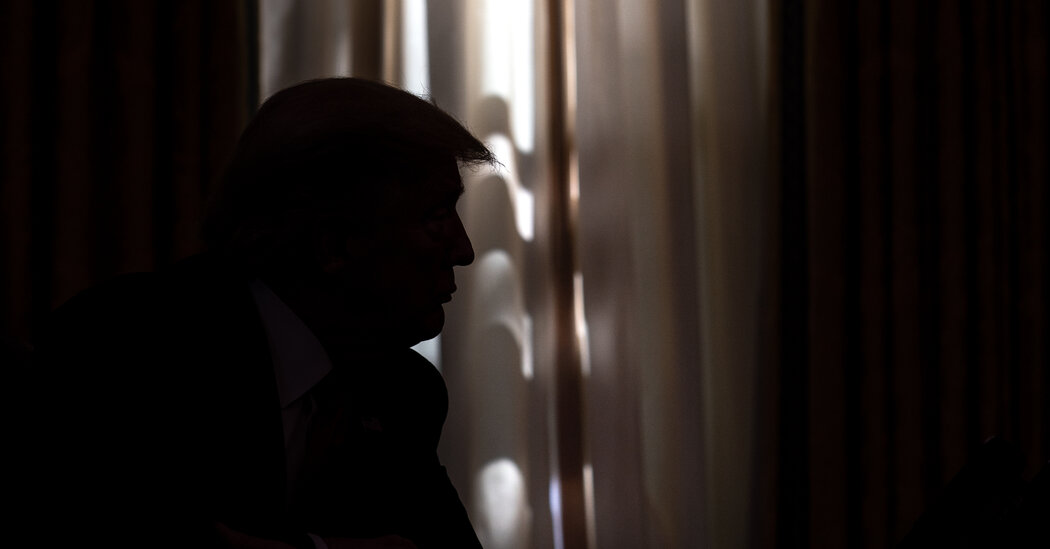Donald Trump went to Capitol Hill last week to visit with House Republicans. According to most reports of the meeting, he rambled.
People present told the nonprofit news outlet NOTUS that the former president “treated his meeting as an opportunity to deliver a behind-closed-doors, stream-of-consciousness rant” in which he “tried to settle scores in the House G.O.P., trashed the city of Milwaukee and took a shot at Nancy Pelosi’s ‘wacko’ daughter.” It was “like talking to your drunk uncle at the family reunion.”
That same week, Trump met with a group of chief executives at the quarterly meeting of the Business Roundtable. Attendees, CNBC reports, were disappointed. “Trump doesn’t know what he’s talking about,” said one executive. Others said that Trump was “remarkably meandering, could not keep a straight thought and was all over the map.”
There is a good chance that by the end of the year, Trump will be president-elect of the United States. And yet with less than five months left before the election, he is no more prepared for a second term than he was for a first. He might even be less prepared: less capable of organizing his thoughts, less able to speak with any coherence and less willing to do or learn anything that might help him overcome his deficiencies.
Everything that made Trump a bad president the first time around promises to make him an even worse one in a second term.
When I say “bad” here, I don’t mean the content of Trump’s agenda, as objectionable as it is, as much as I do his ability to handle the job of chief executive of the United States. In a political culture as obsessed with drama and celebrity as our own, it is easy to lose sight of the fact that the presidency is an actual job — one of the most difficult in the world.
“Just a partial list of all that must go right in a presidency starts to stretch the limits of human endeavor,” John Dickerson, a reporter and anchor for CBS News, writes in “The Hardest Job in the World: the American Presidency.”
“A president,” he goes on to say, “needs to pick the right team in a hurry, including a chief of staff who gets the balance of information flow, delegation, and gatekeeping just right. The cabinet needs to be filled with leaders who have autonomy, but not so much ego that they create political disasters. A president must have exquisite fingertip feel for prioritization, communication and political nuance.”
Trump, in his first term, was not equipped to do the work required of him.
As Jonathan Bernstein, a political scientist, notes in a post for his Substack newsletter, Trump “utterly failed” at the “most important thing for presidents to do in order to succeed: collecting information. Trump didn’t read. He didn’t pay attention during briefings. He didn’t care about policy. He didn’t even bother, as far as anyone can tell, to learn the basic rules of the constitutional system.”
It’s not as if we can expect things to be better in a second term. “Everyone makes mistakes and ideally learns from them,” Matthew Yglesias observes in a recent analysis of Trump’s record as president. “As best I can tell, what Trump learned from his term is that he needs to double-down on surrounding himself with craven loyalists who won’t contradict him.”
There is an obvious rejoinder here: How is it possible that Trump is both incompetent and a dangerous authoritarian? How can he undermine American democracy when he struggles to manage his administration?
The answer is that this only seems like a contradiction. In truth, these two sides of the former president are easy to reconcile.
Trump’s authoritarian instincts — his refusal to accept, or even learn, the rules of the constitutional system — are a huge part of the reason he struggled in the job of president. They helped produce the chaos of his administration. That, in turn, has led him to want to corrode and strip away those rules and strictures that stand in the way of his desire to impose his will directly, both on the government and the country at large.
As Dickerson writes, “Trump is in rebellion against the presidency. Its traditions get in the way of the quick results he wants. He either sidesteps or flattens obstacles or opponents that irritate him or slow him down.”
By no means is Trump the first president, or even the first Republican president, to abuse the power of the office in an effort to overcome the constitutional limits of the office. We can see something similar with Richard Nixon and Watergate as well as Ronald Reagan and Iran-contra, when the White House circumvented a congressional prohibition on foreign aid to rebel groups in Nicaragua.
But Trump makes no distinction between himself and the office of the presidency. He is the kind of man who might say “L’État, c’est moi,” if he knew of anything other than his own desires. He has the heart of an absolutist.
For Trump to bend to the presidency, he would have to embark on the impossible task of denying himself the satisfaction of imposing his will on others. And so Trump has tried to break the presidency instead, to transform a constitutional office defined by its limits into an instrument of his personal authority.
A second term would mean even more of the chaos, corruption, disorder and incompetence that defined his first four years in office. Trump and his more ideologically driven allies and advisers will smash through the constitutional system, in a reckless drive to satisfy their dreams, desires and delusions.
The Times is committed to publishing a diversity of letters to the editor. We’d like to hear what you think about this or any of our articles. Here are some tips. And here’s our email: letters@nytimes.com.
Follow the New York Times Opinion section on Facebook, Instagram, TikTok, WhatsApp, X and Threads.
